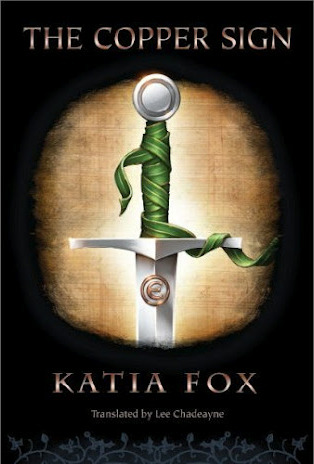 The year of our Lord 1161 is not a great time to be a girl — even less so a girl who wants to become a swordsmith. Forced to flee her home in rural England, our young heroine Ellenweore disguises herself as a boy and travels with a famous swordsmith to Normandy, where sons of noblemen are trained to be knights.
The year of our Lord 1161 is not a great time to be a girl — even less so a girl who wants to become a swordsmith. Forced to flee her home in rural England, our young heroine Ellenweore disguises herself as a boy and travels with a famous swordsmith to Normandy, where sons of noblemen are trained to be knights.
Thus begins Ellen’s journey. Katia Fox’s The Copper Sign (translated from the original German by Lee Chadeayne) takes the reader on a journey across France and England, and follows Ellen for more than two decades as she fights for survival in a harsh world.
Sad trombone sound
I spent most of my time with this book doing variations of this:
I love a good YA fantasy with a kickass heroine, but The Copper Sign was…well, bad.
Fox had me hooked until oh, about page 15, when she lobbed the first of many plot harpoons that yank Ellen roughly from plot point to plot point for the next 600+ pages. It got boring, quick.
- Ellen arrives in a town
- She wins over stubborn but secretly kind-hearted person who can help her
- She learns an “amazing” skill or two
- Bad Guy (who’s obsessed and seems to always “accidentally” end up in the same ass-backward French hamlet) bribes someone to do Something Bad
- Ellen is blamed
- Ellen runs away to next town
- Ellen never sees those people again, and nothing more is ever heard of whatever crime she was accused of committing in said town
Holy overblown history, Batman!
I’d wager that Fox spends at least a third of the book describing in excruciatingly boring detail the process of swordsmithing, or scabbard building, or goldsmithing. It’s cool stuff that’s interesting in small doses, but it throws off the plot and just ends up being stuff you have to skim while hoping you don’t miss an actual plot point.
Ham-fisted translation
There were two distinct moments during which I was keenly aware I was reading a translation (originally German) — both happen when the story introduces a character whose name coincides closely with the person’s defining characteristic. For example:
The training instructor for Sir Ansgar’s squires was named Ours, that is, bear in French. Ellen wondered whether his parents had given him the name because they knew how strong he would become…
This is just badly done. Anyone who speaks French will find the inserted translation unnecessary, and those who don’t speak French — like me — may find themselves yanked mercilessly from the diegesis every time this happens:
Ho hum enjoying the story— hm, why would that translation be there? Maybe they thought boneheaded English speakers wouldn’t get the reference. Wait, what’s happening? I’ve forgotten what was happening.
At first I was inclined to blame Chadeayne (the translator), but then I realized that he also translated Oliver Pötzsch’s The Hangman’s Daughter, which I really enjoyed…although now that I look back at the review I had some language problems with that, too.
Not for the middle school set
The definition of “Young adult fiction” seems to be constantly in flux, but I think many readers would plant The Copper Sign firmly within this category (well, maybe YA Fantasy).
And while I think it’s a perfectly fine book for a high schooler, it’s not something I’d want my 6th, 7th, or 8th grader reading. The book is full of brutal sex, incest, rape, and homophobia — most of it perpetuated by the perverted antagonist.
I know the 12th century wasn’t exactly peaches and cream, but there’s just so much of the nasty stuff in The Copper Sign that I wouldn’t let my middle schooler read it — and I really wouldn’t want to talk about the moment when Ellen describes her parents’ sexual activities as being accompanied by “a peculiar, fishy odor”!
Run far, far away
To sum up my review of The Copper Sign (using a quote attributed to Dorothy Parker):
This is not a novel to be tossed aside lightly. It should be thrown with great force.
I would never wish for a book to be burnt, but in this case I will go so far as to wish it hadn’t been written — or at least that I hadn’t wasted my time reading it.
What’s your most recent “I wish I’d never read this” moment?






